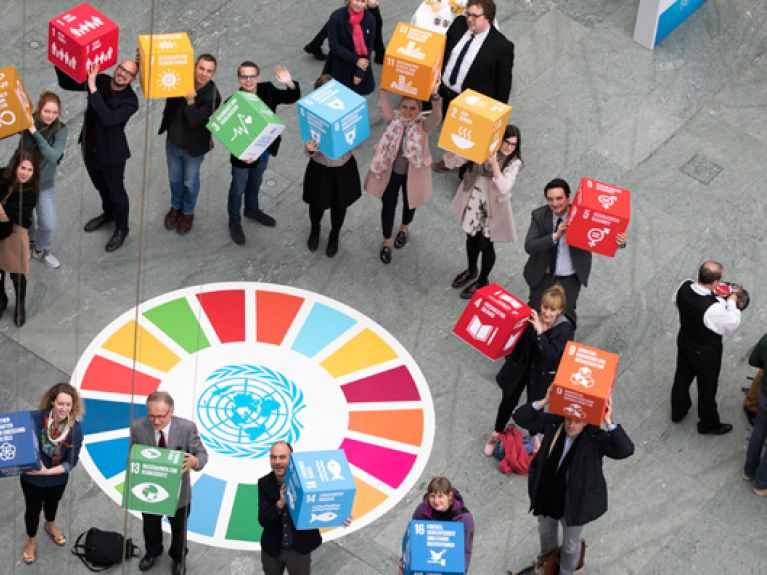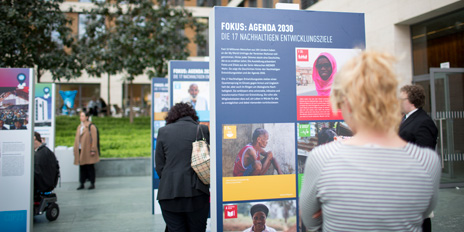A world without poverty
All children go to school, starvation and thirst are things of the past: An exhibition in the German Federal Foreign Office reveals what the world could be like if the United Nations’ “Agenda 2030” is a success.

Germany. There are studies, surveys, books, to do with poverty – with figures, definitions, reports from individual federal states. Sometimes, however, an image and a quotation can say more than any number of facts. Take the photo of the man in the Philippines, for example. He is crouching in front of a dirty wall, and in just one sentence puts the important topic in a nutshell: “My biggest struggle every day is to find something to eat.” He lives in Manila, a conurbation with 12 million inhabitants that has grown out of several individual cities and where the contrasts between rich and poor are enormous.

The Philippines are one of the protagonists in the series of images entitled “Menschen MEINER Welt” (People in MY World), which is being showcased until 10 May in the “Lichthof” at the Federal Foreign Office in Berlin in the exhibition “The United Nations in Germany and the Agenda 2030”. The photos of and quotations by people in many different countries illustrate the United Nations’ worldwide survey “MY World”. In it, 10 million people in 194 countries provided information about what is important to them. At the top of the list, something the exhibition also reveals, is children’s education, followed by better health care and more job opportunities. Protection of our forests and seas, better phone and Internet connectivity, and measures against climate change tended to be at the bottom of the list of people’s personal priorities.
Milestones of development policy
The survey draw on the 17 Sustainable Development Goals (SDGs), which in 2016 replaced the Millennium Development Goals and are meant to be achieved by 2030. An interactive animation in the “Lichthof” demonstrates what the world would be like if the “Agenda 2030” were a success: All children would go to school, mothers would survive childbirth, hunger and poverty would be things of the past, and there would clean drinking water everywhere. In his welcome address, Federal Foreign Minister Sigmar Gabriel referred to the goals that make up the “Agenda 2030” as a “milestone for international order”.
The SDG Action Campaign is highlighting the goals of sustainable development and how they will be implemented world-wide. It is based in Bonn, making it the 19th United Nations institution in the city. A total of more than 1,000 people currently work for the United Nations (UN) in Bonn – for example for the German Climate Secretariat of the United Nations Framework Convention on Climate Change (UNFCCC) or for the United Nations University (UNU). The exhibition also highlights the work of the UN institutions in Germany. Bonn is the largest UN hub and many people in Germany are aware of this, and the fact that UN organisations ranging from the ILO to UNHCR maintain offices in Berlin hardly comes as a surprise, other institutions tend to be relatively unknown: The International Tribunal for the Law of the Sea in Hamburg, or the UNU office of UNU-Flores in Dresden.
New ideas to prevent starvation
One of the newest and most exciting UN institutions is based on Munich: There, staff members of the World Food Programme have worked at the UN WFP’s Innovation Accelerator since 2016 – in an office along with scientists and representatives of the business world and civil society. In a classic start-up structure, they together seek to elaborate ideas and solutions for a world without hunger. After less than one year, the Accelerator is already supporting 20 WFP projects worldwide; its efforts are in turn supported by the German Federal Foreign Office, the German Federal Ministry for Economic Cooperation and Development and the Bavarian State Ministry of Food, Agriculture and Forestry.
Deutschland.de dossier on Bonn, Germany’s United Nations City
Exhibition: “The United Nations in Germany and the Agenda 2030 “, Federal Foreign Office, Berlin, thru 10 May 2017.
© www.deutschland.de

